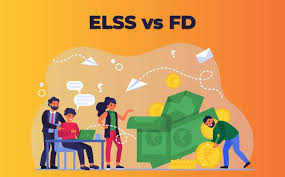When it comes to saving taxes and growing your wealth, two popular investment options often come to mind. These are Fixed Deposits (FDs) and Equity Linked Savings Schemes (ELSS). Both offer tax deductions under Section 80C of the Income Tax Act. But, they differ significantly in terms of returns, risk, and investment horizon. In this article, we’ll dive deep into the FD vs ELSS debate. This will help you make an informed decision based on your financial goals and risk appetite.
Understanding Fixed Deposits (FDs)
What are Fixed Deposits?
Fixed Deposits are traditional investment instruments offered by banks and financial institutions. When you invest in an FD, you deposit a lump sum for a fixed tenure at a predetermined interest rate. The interest earned on your deposit is added to your principal amount, resulting in guaranteed returns.
Key Features of Fixed Deposits
- Guaranteed Returns: The interest rate is fixed at the time of investment, ensuring predictable returns.
- Flexibility: You can choose tenures ranging from 7 days to 10 years, depending on your financial goals.
- Low Risk: FDs are considered one of the safest investment options as they are not linked to market fluctuations.
- Loan Against FD: Most banks, including Airtel Finance, allow you to avail of a loan against your fixed deposit, providing liquidity when needed.
Tax Benefits of Fixed Deposits
Tax-saving FDs, with a lock-in period of 5 years. They offer tax deductions of up to ₹1.5 lakh per financial year under Section 80C. However, the interest earned on these deposits is taxable as per your income tax slab. Suppose you fall in the 30% tax bracket and earn an interest of ₹50,000 from your FD. Then, you’ll have to pay a tax of ₹15,000 (30% of ₹50,000) on the interest income.
Exploring Equity Linked Savings Schemes (ELSS)
What are ELSS Funds?
ELSS funds are diversified equity mutual funds that invest primarily in stocks. They come with a mandatory lock-in period of 3 years, the shortest among all Section 80C investments. ELSS funds aim to generate higher returns by capitalizing on the growth potential of the equity market.
Key Features of ELSS Funds
- Short Lock-In: The 3-year lock-in period of ELSS is shorter than the 5-year lock-in for tax-saving FDs.
- Diversification: ELSS funds invest in a basket of stocks across sectors, minimizing the impact of individual stock performance.
- Market-Linked Returns: ELSS returns are subject to market fluctuations, offering the potential for higher growth compared to FDs.
- SIP Option: You can invest in ELSS through Systematic Investment Plans (SIPs), allowing you to stagger your investments over time.
Tax Benefits of ELSS Funds
ELSS investments qualify for tax deductions of up to ₹1.5 lakh under Section 80C. Additionally, long-term capital gains up to ₹1 lakh are tax-exempt. Let’s say you invest ₹1.5 lakh in an ELSS fund and after 3 years, your investment grows to ₹2 lakh. The capital gain of ₹50,000 (₹2 lakh – ₹1.5 lakh) will be tax-free.
FD vs ELSS: A Comparative Analysis
When deciding between ELSS or FD which is better, largely depends on your financial goals, risk tolerance, and investment horizon. Here they are:
Returns
- FDs offer guaranteed returns in the range of 5-7% per annum.
- ELSS funds have the potential to generate higher returns. They are typically in the range of 10-15% per annum, based on market performance.
Risk
- ELSS funds are subject to market risks, and the returns are not guaranteed.
- FDs are low-risk investments, offering capital protection and assured returns.
Lock-In Period
- Tax-saving FDs have a lock-in period of 5 years.
- ELSS funds have a shorter lock-in period of 3 years.
Taxation
- Interest earned on FDs is taxable as per your income tax slab.
- Long-term capital gains up to ₹1 lakh from ELSS funds are tax-exempt.
|
Parameter |
Fixed Deposit |
ELSS |
|
Returns |
Guaranteed (7 – 9.1%) |
Market-linked (10-15%) |
|
Risk |
Low |
Moderate to High |
|
Lock-In |
5 years |
3 years |
|
Taxation |
Interest taxable |
LTCG up to ₹1 lakh tax-free |
Which One Should You Choose?
The comparison of ELSS vs FD depends on your risk appetite, investment horizon, and financial goals. If you prioritize safety and guaranteed returns, FDs might be suitable. Let’s say you have a longer investment horizon and are willing to take some risk for potentially higher returns. Then, ELSS funds could be a better choice.
Here’s a simple rule of thumb:
- For Short-term Goals (less than 3 years): Consider FDs or other low-risk investments.
- For Long-term Goals (more than 3 years): ELSS funds can help you create wealth while saving taxes.
- For a Balanced Approach: You can allocate a portion of your investment to both FDs and ELSS based on your risk profile.
Investing with Airtel Finance
Airtel Finance offers competitive interest rates on fixed deposits, as short as 7 days. You can easily calculate your expected returns using their FD interest calculator.
To invest in an FD with Airtel Finance, you need to submit basic documents. This can be your PAN card, address proof, and a recent photograph. The process is simple, and you can manage your investments online through their user-friendly portal.
ELSS vs fixed deposit both serve different purposes in your investment portfolio. While FDs provide stability and guaranteed returns, the potential for wealth creation along with ELSS tax saving. By understanding their unique characteristics and aligning them with your financial goals, you can make an informed decision.
Remember, investing is a personal journey, and there’s no one-size-fits-all approach. Take the time to assess your risk profile, investment horizon, and tax-saving requirements before making a choice. If you’re unsure, consider consulting a financial advisor who can guide you based on your specific circumstances.
FAQs:
1. What is the lock-in period for ELSS compared to Fixed Deposits?
ELSS has a shorter lock-in period of 3 years, while tax-saving FDs have a lock-in of 5 years.
2. Are ELSS investments riskier than Fixed Deposits?
Yes, ELSS investments are subject to market risks, while FDs offer guaranteed returns and capital protection.
3. Can ELSS help in building long-term wealth better than Fixed Deposits?
Yes, ELSS funds have the potential to generate higher returns compared to FDs, making them suitable for long-term wealth creation.
4. How does taxation on returns differ for FD and ELSS investments?
Interest earned on FDs is taxable as per your income tax slab. Meanwhile, long-term capital gains up to ₹1 lakh from ELSS are tax-exempt.
5. How does Fixed Deposit compare to ELSS in terms of tax-saving benefits?
Both FDs and ELSS offer tax deductions up to ₹1.5 lakh under Section 80C. However, ELSS also provides tax-free long-term capital gains up to ₹1 lakh.


 Get App
Get App  Airtel Store
Airtel Store  Login
Login 


